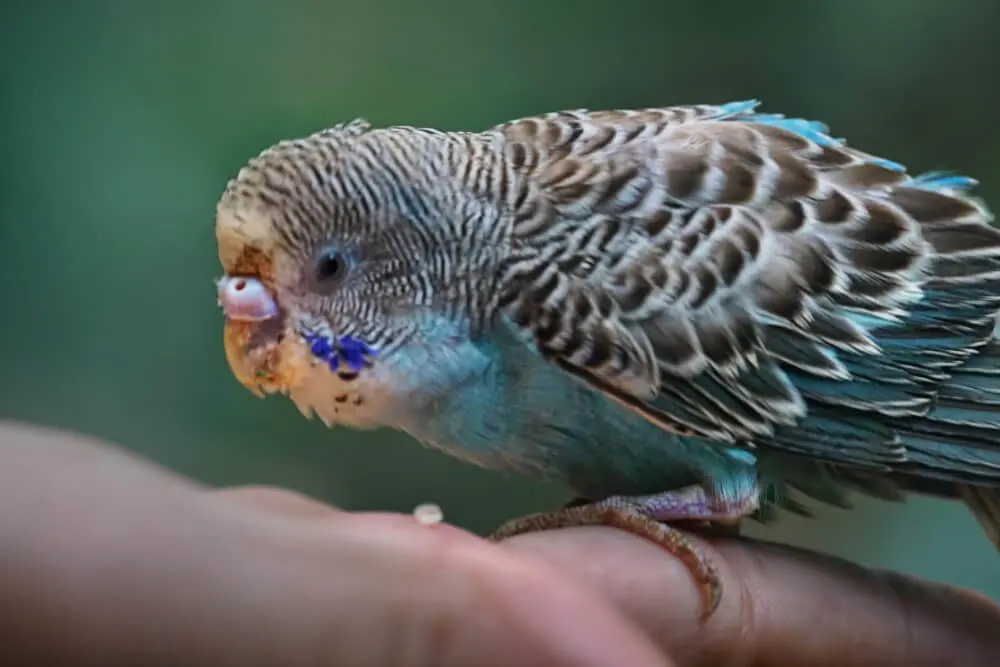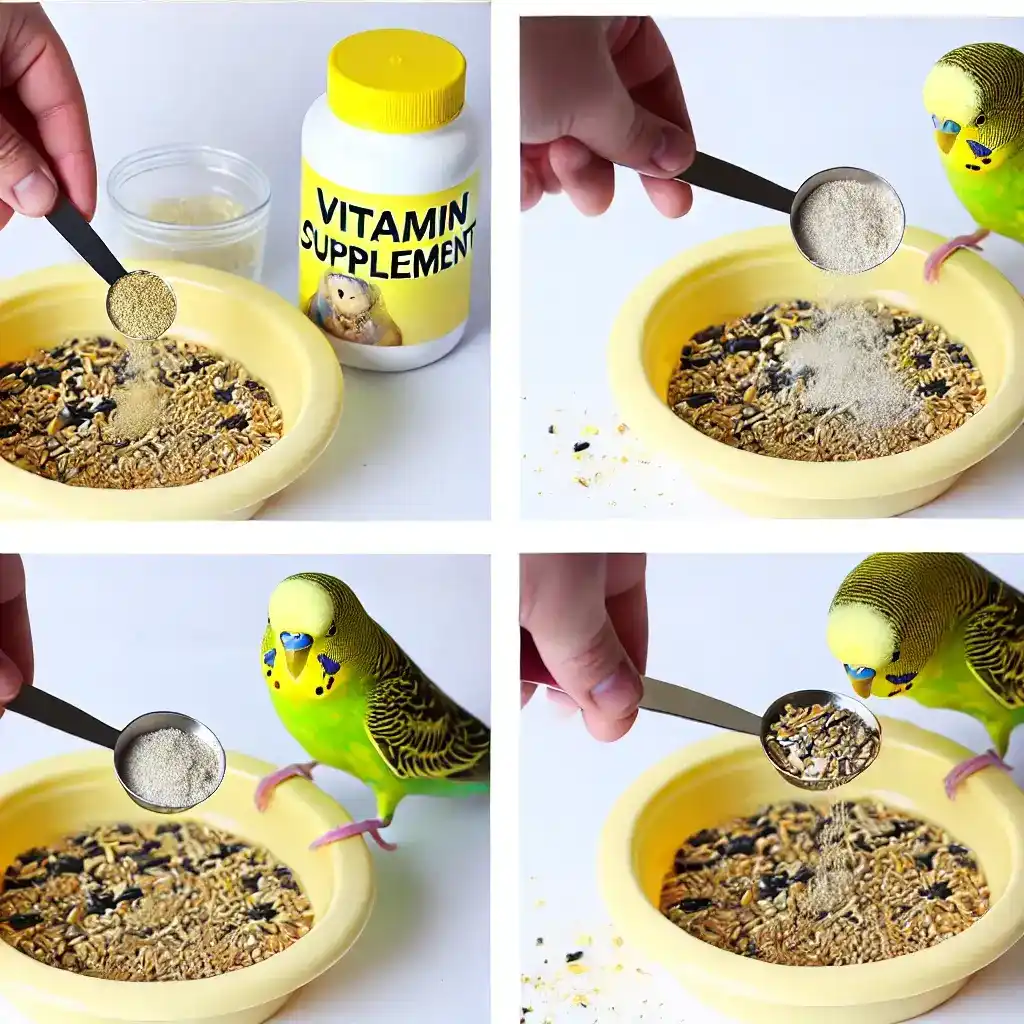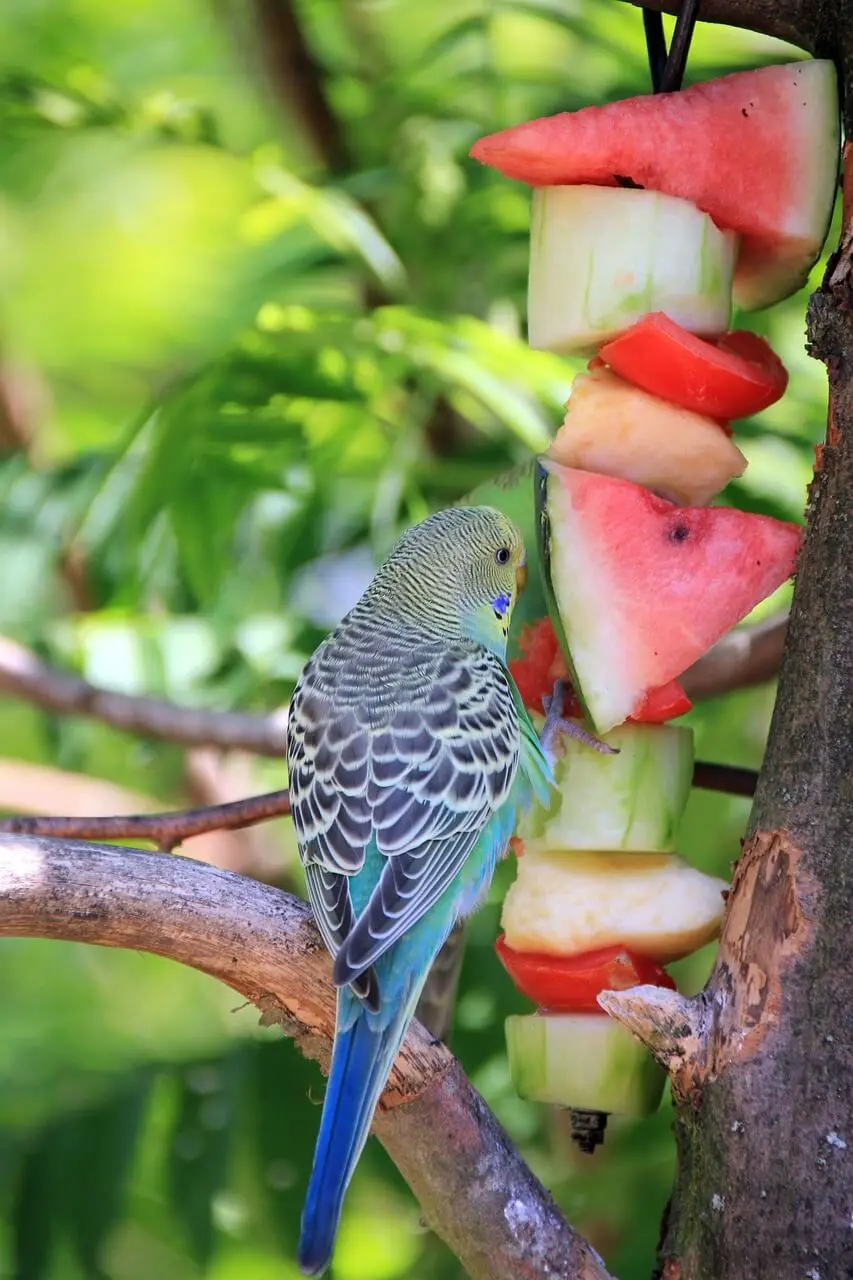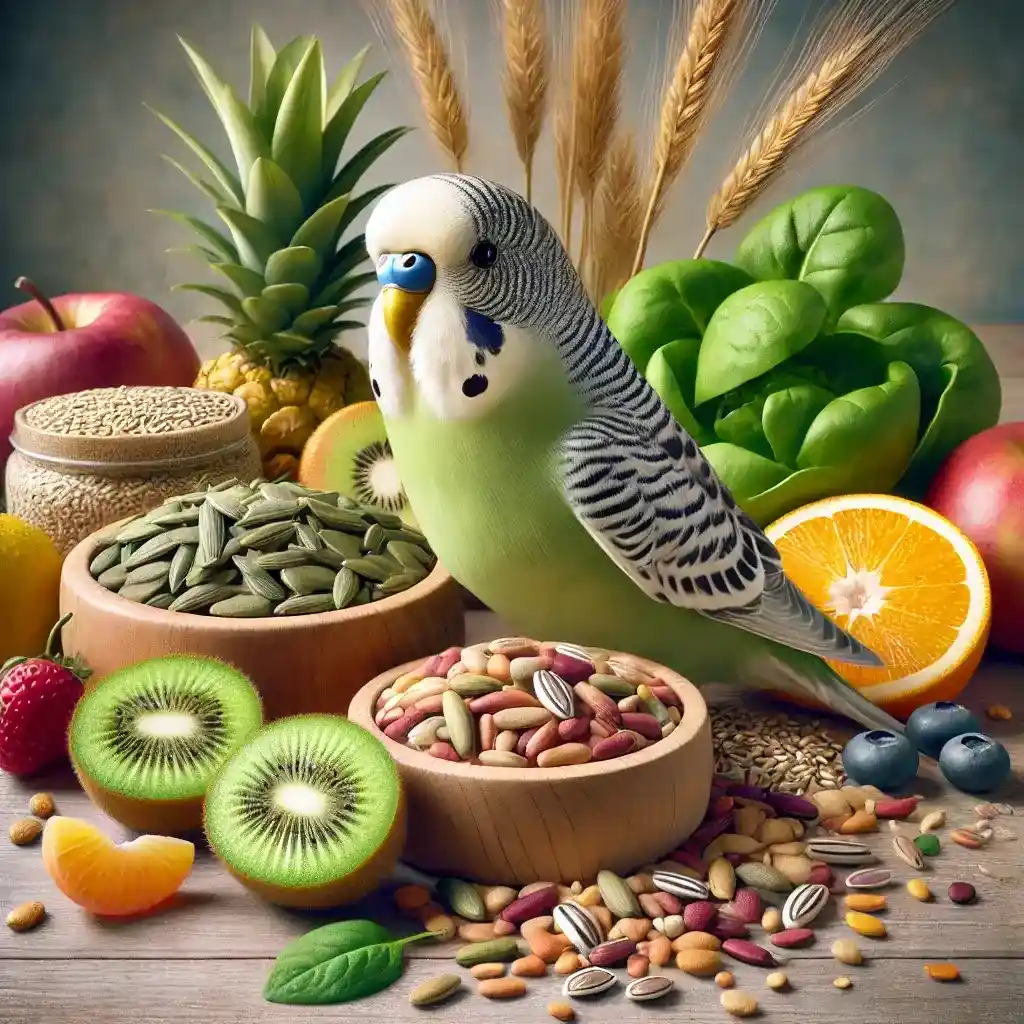Introduction to Vitamins and Supplements for Budgerigars
Budgerigars, also known as budgies or parakeets, are small, vibrant birds that bring joy and color into our lives. Like any pet, keeping them healthy and happy requires more than just providing a comfortable cage and fresh water. Ensuring your budgerigar gets the right vitamins and supplements is crucial for their overall well-being.
While a balanced diet of seeds, fruits, and vegetables can provide many of the essential nutrients budgerigars need, it might not always be enough to meet all their nutritional requirements. This is where vitamins and supplements come into play. They help fill the nutritional gaps that might exist in your bird’s diet, ensuring that your feathered friend remains active, vibrant, and healthy.
Vitamins like Vitamin A, D3, and E, as well as supplements such as calcium and probiotics, are essential for budgerigars. These nutrients support everything from their immune system to their bone health, helping to prevent common health issues like vitamin deficiencies and weak bones.
But why exactly are these vitamins and supplements so important? And how do you make sure you’re giving your budgie the right amount without overdoing it? In this guide, we’ll explore the essentials of budgerigar nutrition, covering everything you need to know to keep your bird healthy and thriving.
Whether you’re a new budgie owner or just looking to improve your pet’s diet, understanding the role of vitamins and supplements can make a significant difference in their quality of life. Let’s dive in and explore the best ways to support your budgerigar’s health with the right nutrition.
Why Vitamins and Supplements are Important for Budgerigars
Budgerigars are small birds with big needs when it comes to nutrition. Just like humans, they require a well-rounded diet to stay healthy, and that’s where vitamins and supplements come into play. While your budgie might seem content nibbling on seeds and the occasional fruit, these foods alone may not provide all the nutrients they need to thrive.
Vitamins and supplements are important for budgerigars because they help fill in the nutritional gaps that can exist in a typical budgie diet. For instance, Vitamin A is essential for maintaining good vision and a healthy immune system, but it’s often lacking in seed-heavy diets. Similarly, Vitamin D3 is crucial for calcium absorption, which supports strong bones and prevents conditions like brittle bones and egg-binding in female budgerigars.
Supplements like calcium are equally important, especially for birds that don’t get enough of this mineral from their regular food. Calcium plays a vital role in bone development and egg production, making it a must-have for breeding budgerigars. Probiotics are another valuable supplement, helping to maintain a healthy gut and support digestion, which is key to overall health.
Providing the right vitamins and supplements can prevent common health issues in budgerigars, such as vitamin deficiencies, poor feather quality, and weakened immune systems. By ensuring your budgie gets the essential nutrients they need, you’re not just promoting their immediate well-being, but also supporting their long-term health.
Incorporating vitamins and supplements into your budgie’s diet doesn’t have to be complicated. Many of these nutrients can be added to their water or food, making it easy to ensure they’re getting what they need. However, it’s important to do so with care, as too much of a good thing can sometimes lead to other health issues. Always consult with a vet or avian expert to determine the right balance for your bird.
In summary, vitamins and supplements play a critical role in keeping your budgerigar healthy and happy. They’re a simple yet effective way to boost your bird’s nutrition, supporting everything from their immune system to their bone health. By paying attention to these nutritional needs, you’re ensuring that your feathered friend enjoys a long, vibrant life.

A selection of bird vitamins and calcium supplements, highlighting the importance of proper nutrition and supplementation for budgerigars.
Essential Vitamins for Budgerigars
Budgerigars, like all living creatures, require a range of vitamins to maintain their health and vitality. A deficiency in any of these essential vitamins can lead to health problems that could easily be avoided with proper nutrition. Let’s explore the key vitamins your budgie needs and why they’re so important.
Vitamin A
Vitamin A is crucial for maintaining good vision, healthy skin, and a robust immune system in budgerigars. It helps prevent infections and keeps their feathers looking vibrant and shiny. A lack of Vitamin A can lead to respiratory issues and other health problems. While some foods like carrots and leafy greens are rich in Vitamin A, supplements can help ensure your budgie is getting enough of this vital nutrient.
Vitamin D3
Vitamin D3 is essential for calcium absorption, which is critical for bone health. Budgerigars that don’t get enough sunlight may suffer from a Vitamin D3 deficiency, leading to weak bones or even egg-binding in females. Supplementing their diet with Vitamin D3, especially if they are indoors most of the time, helps ensure they have strong bones and a healthy metabolism.
Vitamin E
Vitamin E acts as an antioxidant, protecting your budgie’s cells from damage and supporting their immune system. It also plays a role in reproductive health, making it particularly important for breeding budgerigars. Foods like seeds and nuts provide some Vitamin E, but adding a supplement can help maintain optimal levels, especially during breeding season.
Vitamin K
Vitamin K is important for blood clotting and bone health. A deficiency in this vitamin can lead to excessive bleeding and weakened bones. While it’s less common to see a Vitamin K deficiency in budgerigars, ensuring they have enough through a balanced diet or supplements is crucial for their overall health.
B-Vitamins
The B-vitamin group, including B1 (thiamine), B2 (riboflavin), B6, and B12, plays a significant role in energy production and overall metabolism. These vitamins help your budgie convert food into energy, support nervous system health, and promote a healthy appetite. A deficiency in B-vitamins can lead to lethargy, poor feather condition, and even neurological issues.
Ensuring Your Budgie Gets Enough Vitamins
A varied diet that includes fresh fruits, vegetables, and high-quality bird seed can provide many of these essential vitamins. However, supplements are often necessary to fill any nutritional gaps, especially if your budgie’s diet is primarily seed-based.
When introducing vitamin supplements, it’s important to follow the recommended dosages and consult with an avian vet to avoid over-supplementation, which can be harmful. By ensuring your budgerigar receives these essential vitamins, you’re helping them stay healthy, active, and full of life.
Key Supplements for Budgerigars
Supplements play a vital role in ensuring that budgerigars receive all the nutrients they need for a healthy, vibrant life. Even with a balanced diet, certain essential nutrients might still be lacking, and this is where supplements come in handy. Below are the key supplements that can help keep your budgie in peak condition.
Calcium
Calcium is one of the most important minerals for budgerigars, especially for breeding females. It’s essential for strong bones, healthy beaks, and egg production. Without enough calcium, budgies can suffer from brittle bones or, in the case of females, egg-binding, which can be life-threatening. Calcium supplements can be added to their diet, either through calcium-enriched cuttlefish bones or powdered forms mixed with their food.
Iodine
Iodine is crucial for proper thyroid function in budgerigars. A deficiency can lead to goiter, a condition where the thyroid gland enlarges, causing breathing difficulties. Many bird seed mixes don’t provide enough iodine, making it an important supplement to consider. Iodine blocks or liquid iodine supplements added to their water can help maintain proper thyroid health.
Probiotics
Probiotics are beneficial bacteria that help maintain a healthy gut flora in budgerigars. A healthy digestive system is crucial for nutrient absorption and overall health. Probiotics can be particularly helpful after antibiotic treatments or during times of stress, as they help restore the natural balance of gut bacteria. These supplements can be easily added to your budgie’s water or food to support their digestive health.
Omega-3 Fatty Acids
Omega-3 fatty acids are important for maintaining healthy skin and feathers in budgerigars. They also support heart health and have anti-inflammatory properties. While these fatty acids are found in some seeds and nuts, supplementing with omega-3 can help ensure your budgie receives an adequate amount. These supplements are usually available in liquid form and can be mixed with food or water.
How to Use Supplements Safely
While supplements are beneficial, it’s important to use them wisely. Over-supplementation can lead to health problems, so it’s always best to consult with an avian vet before adding any new supplements to your budgie’s diet. The right balance of supplements will help support your budgie’s overall health and ensure they live a long, happy life.
By understanding and using these key supplements, you can fill any nutritional gaps in your budgerigar’s diet, helping them to stay healthy, active, and full of life. Whether it’s calcium for strong bones or probiotics for a healthy gut, these supplements can make a significant difference in your budgie’s well-being.
Signs of Vitamin Deficiency in Budgerigars
Ensuring your budgerigar receives a balanced diet rich in essential vitamins and supplements is crucial for their overall health. However, sometimes deficiencies can still occur, and recognizing the signs early can help prevent serious health issues. Below are the common signs of vitamin deficiency in budgerigars and what to look out for.
Dull or Poor Feather Quality
One of the most noticeable signs of a vitamin deficiency, particularly a lack of Vitamin A, is dull, brittle, or poorly formed feathers. Your budgie’s plumage should be vibrant and smooth; if you notice a change in feather quality, it might be a sign that they’re not getting enough of the essential nutrients they need.
Lethargy and Weakness
If your budgie is less active than usual, seems lethargic, or shows signs of weakness, it could be due to a deficiency in B-vitamins. These vitamins are vital for energy production and overall vitality. A lack of B-vitamins can lead to reduced energy levels, affecting your budgie’s ability to fly and play.

A budgerigar displaying signs of vitamin deficiency, underlining the need for proper dietary supplements to prevent health issues.
Respiratory Issues
Vitamin A deficiency can also lead to respiratory problems, as this vitamin is essential for maintaining healthy mucous membranes in the respiratory tract. Symptoms might include wheezing, labored breathing, or frequent sneezing. If you notice any of these signs, it’s important to consult with a vet and consider adjusting their diet or adding supplements.
Poor Appetite and Weight Loss
A lack of certain vitamins, like B-vitamins or Vitamin E, can result in a decreased appetite and gradual weight loss. If your budgie is eating less or losing weight without any clear reason, it might be a sign that their diet is lacking in essential nutrients. This can also lead to a weakened immune system, making them more susceptible to illnesses.
Beak and Nail Abnormalities
Vitamin D3 and calcium deficiencies often manifest in abnormalities in your budgie’s beak and nails. You might notice their beak becoming soft, overgrown, or brittle, and the same could happen with their nails. These symptoms indicate that your budgie’s body isn’t absorbing enough calcium, which is critical for bone health.
Swollen Eyes or Watery Discharge
A deficiency in Vitamin A can also cause eye problems, such as swelling, redness, or a watery discharge. Healthy eyes are crucial for your budgie’s well-being, and any signs of eye issues should be addressed promptly. Increasing their intake of Vitamin A through diet or supplements can often resolve these symptoms.
Taking Action Against Deficiency
If you notice any of these signs in your budgerigar, it’s important to take action quickly. Consult with an avian vet to confirm the deficiency and get recommendations for dietary adjustments or the appropriate supplements. Preventing vitamin deficiency is key to keeping your budgie healthy, active, and happy.
By being aware of these signs and understanding the importance of vitamins and supplements, you can ensure your budgerigar lives a long, vibrant life, free from the complications that come with nutritional deficiencies.
How to Safely Introduce Vitamins and Supplements into Your Budgerigar’s Diet
Introducing vitamins and supplements into your budgerigar’s diet can be a great way to ensure they receive all the essential nutrients they need to stay healthy. However, it’s important to do this safely to avoid over-supplementation and potential health risks. Here’s how you can gradually and safely incorporate these nutrients into your budgie’s daily routine.
Start with a Balanced Diet
Before adding any supplements, make sure your budgerigar is on a balanced diet that includes a variety of seeds, fruits, vegetables, and pellets. A healthy base diet is the foundation of good nutrition. Supplements should only be used to fill in any nutritional gaps, not replace the core diet. For example, offering leafy greens and carrots can provide natural sources of Vitamin A, while seeds can offer some B-vitamins and Vitamin E.
Consult with an Avian Vet
Before introducing any new vitamins or supplements, it’s wise to consult with an avian vet. They can assess your budgie’s current health and diet and recommend specific supplements based on their needs. A vet can also advise on the correct dosage, ensuring your budgie gets just the right amount without risking over-supplementation.
Gradual Introduction
When introducing a new supplement, start slowly. Gradually incorporate it into their diet to see how your budgie responds. For example, if you’re adding a calcium supplement, begin with a small amount mixed into their food or water, then slowly increase to the recommended dosage over a week or two. This gradual approach helps your budgie’s body adjust to the new nutrient and reduces the risk of digestive upset.
Use High-Quality, Bird-Specific Supplements
Always choose high-quality supplements that are specifically formulated for birds. Human vitamins and supplements are not suitable for budgerigars and can be harmful. Bird-specific products ensure that the dosages are appropriate for your budgie’s size and dietary needs. Look for reputable brands and check labels to ensure the product meets your budgie’s requirements.
Monitor Your Budgie’s Response
After introducing a supplement, keep a close eye on your budgie’s behavior, appetite, and overall health. Watch for any changes, positive or negative, and adjust the dosage if necessary. If you notice any adverse reactions, such as lethargy, changes in droppings, or loss of appetite, stop the supplement and consult your vet immediately.
Rotate and Reassess
Not all supplements need to be given daily. Some, like calcium or probiotics, can be given periodically, depending on your budgie’s needs. Regularly reassess your budgie’s diet and overall health, and adjust the supplementation as necessary. It’s also a good idea to rotate supplements to prevent dependency on any one product.
Introducing vitamins and supplements into your budgerigar’s diet can significantly improve their health and longevity, but it’s important to do so carefully. By starting with a balanced diet, consulting with a vet, and gradually introducing supplements, you can safely boost your budgie’s nutrition and ensure they get the essential vitamins and minerals they need to thrive. Remember, the goal is to support your budgie’s health, not to overwhelm them, so always proceed with caution and care.

A step-by-step guide to adding essential vitamin supplements to a budgerigar’s diet, ensuring they receive all necessary nutrients.
Common Myths and Misconceptions about Budgerigar Supplements
When it comes to caring for budgerigars, there’s a lot of information out there, and not all of it is accurate. Supplements, in particular, are surrounded by myths and misconceptions that can lead to confusion or even harm if not properly understood. Let’s debunk some of the most common myths about budgerigar supplements and clarify what’s best for your feathered friend.
Myth 1: Budgerigars Don’t Need Supplements if They Eat Seeds
One of the most widespread misconceptions is that a seed-only diet is sufficient for budgerigars. While seeds do provide some essential nutrients, they often lack vital vitamins and minerals, such as Vitamin A and calcium. A diet that relies solely on seeds can lead to deficiencies over time, which is why adding supplements to a budgie’s diet is important to fill in those gaps.
Myth 2: All Supplements Are Safe and Can Be Given Freely
Another common belief is that all supplements are safe for budgerigars and can be administered without restriction. In reality, over-supplementation can be just as harmful as a deficiency. For example, too much calcium can lead to kidney problems, and excessive Vitamin D can cause toxicity. It’s crucial to use supplements as directed and consult with an avian vet to determine the right amount for your budgie.
Myth 3: Natural Foods Are Enough to Provide All Necessary Vitamins
While natural foods like fruits and vegetables are great for budgerigars, they might not always provide all the necessary vitamins in the required amounts. For instance, while carrots and leafy greens are high in Vitamin A, a budgie might not consume enough of these foods to meet their nutritional needs. Supplements help ensure that your budgie receives a consistent supply of essential nutrients, regardless of their eating habits.
Myth 4: Vitamins Can Be Added to Water Without Any Issues
Many bird owners believe that adding vitamins to their budgie’s water is an easy and effective way to ensure they get their nutrients. However, this method has its downsides. Vitamins can degrade quickly in water, especially when exposed to light, reducing their effectiveness. Additionally, water with added vitamins can taste different, causing some budgies to drink less, leading to dehydration. It’s often better to mix supplements with food rather than water.
Myth 5: Supplements Are Only Necessary for Sick or Breeding Budgerigars
It’s a common misconception that supplements are only needed when a budgerigar is sick or breeding. In truth, even healthy, non-breeding budgies can benefit from a well-rounded supplement regimen. Supplements help maintain overall health, prevent deficiencies, and support longevity, making them beneficial for all budgerigars, not just those with special health needs.
Understanding the truth behind these common myths and misconceptions about budgerigar supplements can help you make informed decisions about your bird’s health. Supplements are an essential part of ensuring your budgie receives a balanced diet, but they need to be used thoughtfully and responsibly. By debunking these myths, you can better support your budgie’s well-being, ensuring they lead a healthy and happy life.
Tips for Choosing the Right Supplements for Your Budgerigar
Selecting the right supplements for your budgerigar can seem overwhelming, especially with so many products on the market. The key is to choose supplements that address your budgie’s specific nutritional needs while ensuring they’re safe and effective. Here are some tips to help you make the best choices for your feathered friend.
1. Understand Your Budgie’s Dietary Needs
Before purchasing any supplements, it’s important to understand what your budgie’s diet might be lacking. Budgerigars primarily eat seeds, which are often deficient in certain vitamins and minerals like Vitamin A and calcium. Knowing this, you can focus on supplements that fill these specific gaps. For instance, if your budgie doesn’t get enough sunlight, a Vitamin D3 supplement might be necessary to aid in calcium absorption.
2. Consult with an Avian Vet
One of the best ways to ensure you’re choosing the right supplements is by consulting with an avian vet. A vet can evaluate your budgie’s health and diet, and recommend specific supplements based on their needs. This professional guidance can help you avoid over-supplementation and ensure that your budgie is receiving the right nutrients in the correct amounts.
3. Opt for High-Quality, Bird-Specific Supplements
Not all supplements are created equal. It’s crucial to choose high-quality products that are specifically formulated for birds. Human vitamins and supplements may contain ingredients that are harmful to budgerigars. Look for reputable brands that specialize in avian nutrition, and read labels carefully to ensure the supplements are free from artificial additives and fillers.
4. Consider Your Budgie’s Life Stage and Health Status
The nutritional needs of a budgerigar can vary depending on their age, activity level, and health status. For example, breeding budgies may require more calcium and Vitamin E, while older birds might benefit from supplements that support joint health. Tailoring your supplement choices to your budgie’s specific life stage and health conditions ensures they get the best possible care.
5. Start with Small Dosages
When introducing a new supplement, it’s always best to start with a small dosage and gradually increase it as needed. This approach allows you to monitor how your budgie responds and adjust accordingly. Always follow the dosage instructions provided by the manufacturer or your vet to avoid the risk of over-supplementation.
6. Mix Supplements with Food for Easy Administration
To ensure your budgie consumes the supplement, mix it with their food rather than water. This method prevents the supplement from losing potency or affecting the taste of the water, which could deter your budgie from drinking. Sprinkling powdered supplements over fresh fruits or veggies can be an effective way to integrate them into your budgie’s diet.
7. Monitor Your Budgie’s Health and Adjust as Needed
After you’ve introduced a supplement into your budgie’s diet, keep a close eye on their health and behavior. Look for improvements in their energy levels, feather quality, and overall well-being. If you notice any adverse effects, consult with your vet and adjust the dosage or type of supplement accordingly.
Choosing the right supplements for your budgerigar doesn’t have to be complicated. By understanding your budgie’s specific nutritional needs, consulting with an avian vet, and selecting high-quality, bird-specific products, you can ensure your feathered friend stays healthy and happy. With the right approach, supplements can be a simple yet effective way to support your budgie’s overall well-being and longevity.
Frequently Asked Questions (FAQs) about Budgerigar Vitamins and Supplements
When it comes to ensuring your budgerigar receives the right vitamins and supplements, many bird owners have questions. Below are some of the most frequently asked questions, providing clear and concise answers to help you make informed decisions about your budgie’s health.
How often should I give supplements to my budgerigar?
The frequency of supplementing your budgerigar’s diet depends on the type of supplement and your bird’s specific needs. Generally, calcium supplements might be given a few times a week, while vitamins like Vitamin D3 can be administered once or twice weekly, especially if your budgie doesn’t get much sunlight. Probiotics might be used daily or during times of stress. It’s always best to follow the instructions on the supplement packaging and consult with an avian vet for personalized advice.
Can I mix vitamins in my budgerigar’s water?
While it is possible to mix vitamins in your budgie’s water, this method has some drawbacks. Vitamins can degrade quickly when exposed to light and water, reducing their effectiveness. Additionally, altering the taste of the water might deter your budgie from drinking enough, leading to dehydration. It’s often more effective to mix supplements with food, such as sprinkling them over fresh fruits or vegetables.
Are natural food sources enough, or do I need to give supplements?
A diet rich in natural food sources like fresh fruits, vegetables, and high-quality bird seed can provide many essential vitamins. However, budgerigars often have specific needs that might not be fully met by diet alone, especially if they’re on a seed-heavy diet. Supplements can help fill in these nutritional gaps, ensuring your budgie gets all the vitamins and minerals they need for optimal health. It’s about finding the right balance to complement their natural diet.
What are the signs of over-supplementation in budgerigars?
Over-supplementation can be just as harmful as a deficiency. Signs of over-supplementation include lethargy, changes in droppings, loss of appetite, or unusual behavior. For example, too much calcium can lead to kidney issues, and excessive Vitamin D can cause toxicity. If you suspect your budgie is receiving too many supplements, reduce the dosage and consult with an avian vet for further guidance.
Can young budgerigars take the same supplements as adults?
Young budgerigars have different nutritional needs compared to adults, so it’s important to use age-appropriate supplements. For example, calcium is crucial for growing budgies, but the dosage will differ from that of an adult bird. It’s best to consult with a vet who can recommend the right supplements and dosages based on your young budgie’s development stage.
Are there any supplements that should be avoided?
Not all supplements are safe for budgerigars. Avoid supplements that are not specifically formulated for birds, as they might contain ingredients that are harmful to your budgie. Additionally, steer clear of products with artificial additives, preservatives, or excessive sugars. Always choose high-quality, bird-specific supplements and consult with a vet if you’re unsure about a product.
Understanding the right way to use vitamins and supplements is key to maintaining your budgerigar’s health. By addressing these frequently asked questions, you can feel more confident in your ability to provide the best care for your feathered friend. Remember, when in doubt, consulting with an avian vet is the best way to ensure your budgie’s dietary needs are being met safely and effectively.
Conclusion: Ensuring a Balanced Diet for Your Budgerigar
Providing your budgerigar with a balanced diet is one of the most important aspects of keeping them healthy and happy. While seeds, fruits, and vegetables form the foundation of their diet, the addition of essential vitamins and supplements can help ensure your budgie receives all the nutrients they need.
A well-rounded diet that includes the right vitamins and supplements supports everything from strong bones and vibrant feathers to a healthy immune system and overall vitality. By understanding your budgie’s nutritional needs and carefully selecting high-quality supplements, you can prevent common deficiencies and promote long-term health.

A budgerigar eating fresh fruits and vegetables, highlighting the importance of a balanced diet supplemented with essential vitamins.
It’s important to remember that every budgie is unique, with specific dietary needs that can vary based on age, health status, and lifestyle. Regularly consulting with an avian vet and monitoring your bird’s health will help you make informed decisions about their diet and supplementation.
Incorporating supplements like calcium, Vitamin A, and probiotics into your budgerigar’s routine can make a significant difference in their quality of life. However, moderation and careful dosage are key—too much of any supplement can be harmful.
Ultimately, the goal is to provide your budgerigar with a diet that mimics what they would naturally consume in the wild, enriched with the supplements necessary to support their life in captivity. By doing so, you’re not just feeding your budgie; you’re nurturing their overall well-being, helping them to live a vibrant, healthy, and joyful life.

